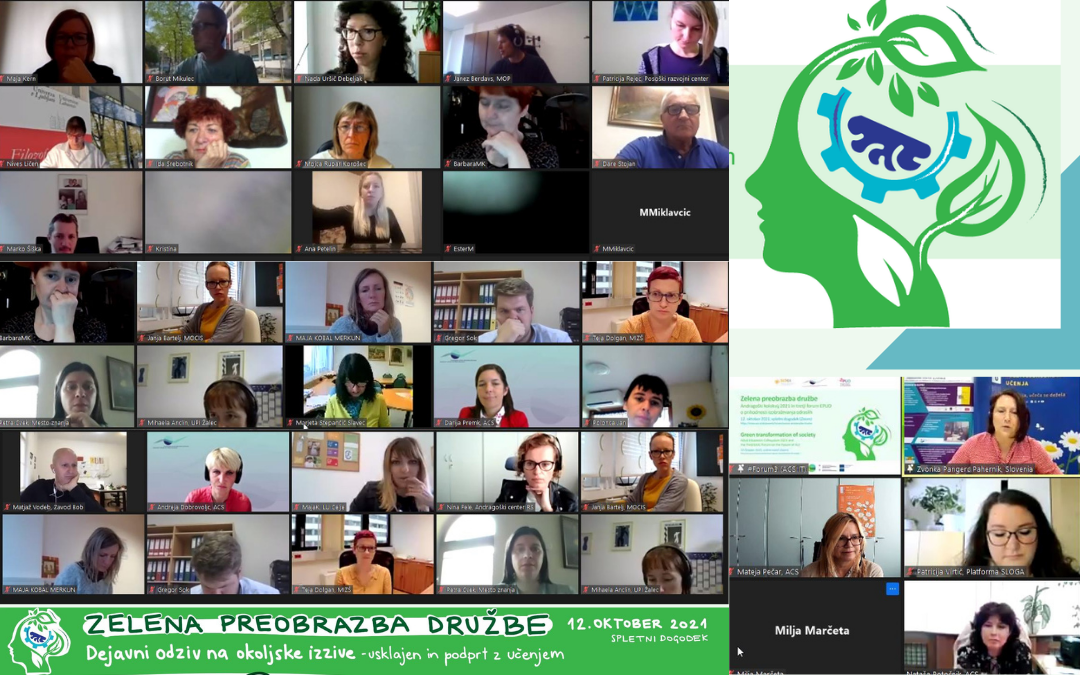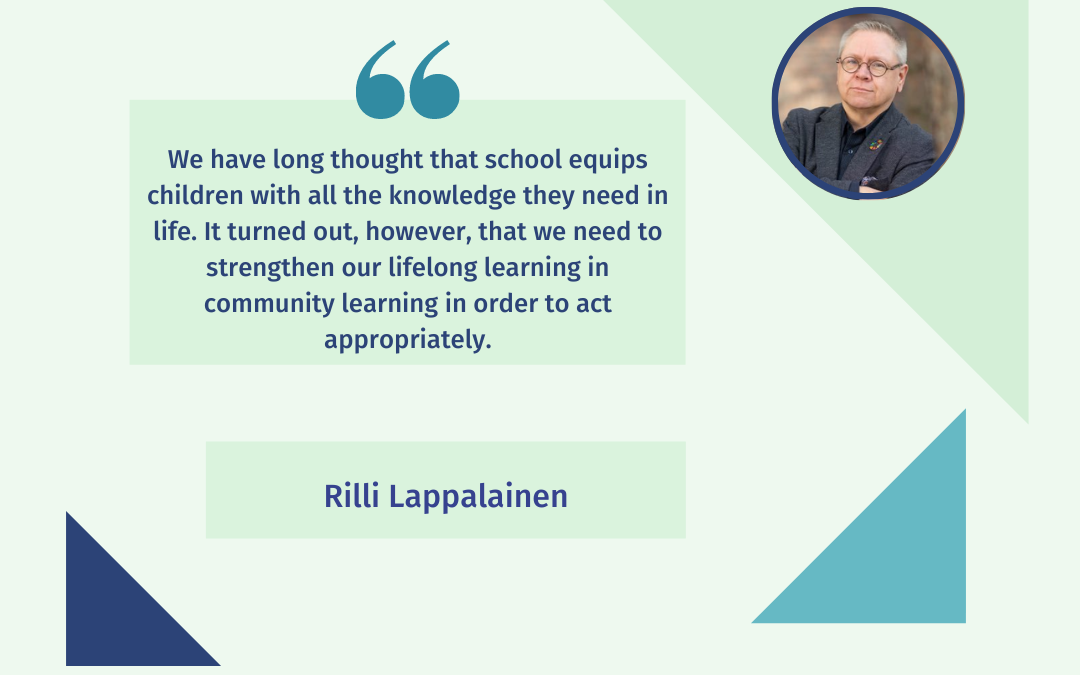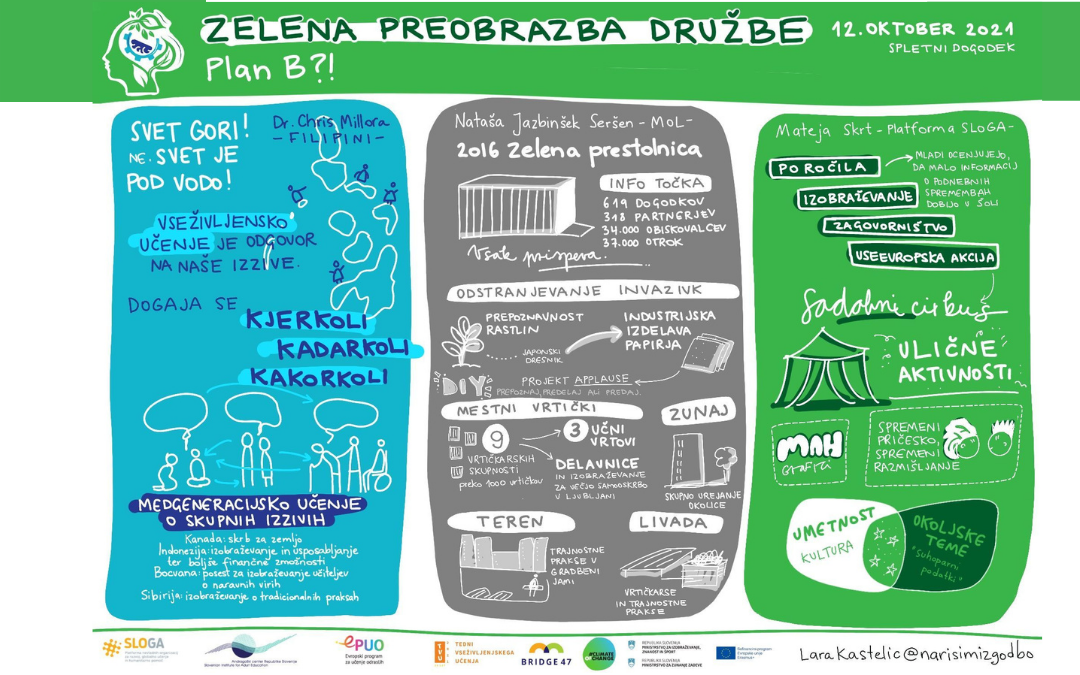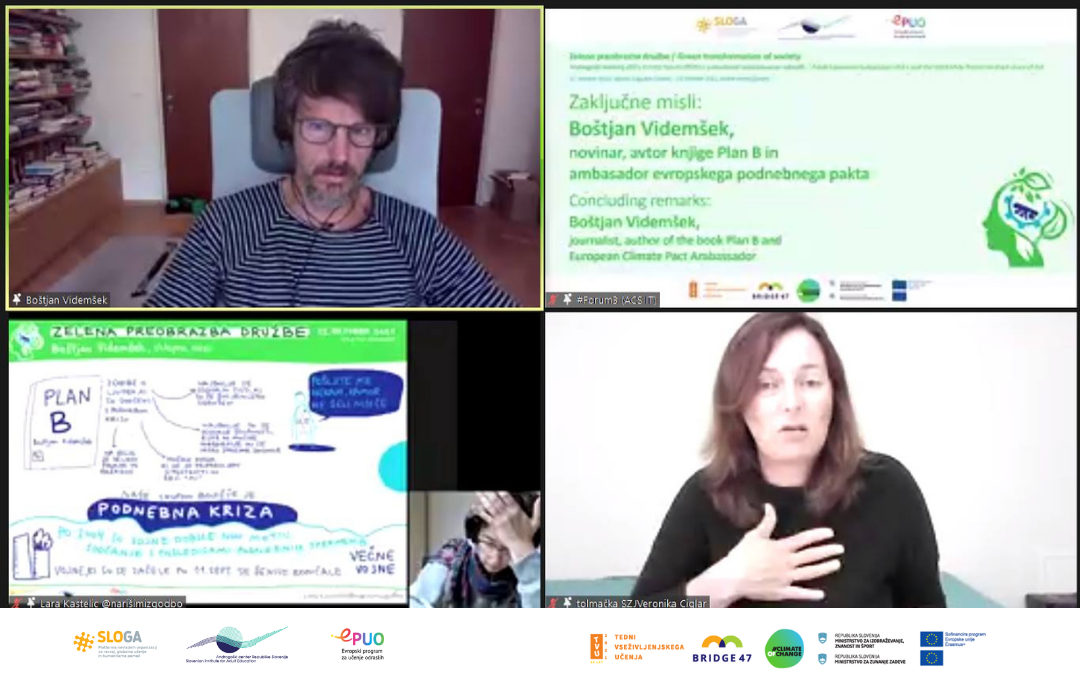The third forum, held on 12 October, again in cooperation with SLOGA Platform, addressed sustainability and attracted around 110 participants. The event was also the 25th Adult Education Colloquium, a national professional event of LLW 2021, and we entitled it the Green transformation of society.
In designing this forum, we considered the premise that green transformation requires broad awareness, new knowledge and skills and a different way of thinking and acting. Sustainable, global learning must be comprehensive in all respects – it must include and connect young people and adults, as well as natural and social sciences and topics. In addition to personal and community transformation, progress is also needed in the field of work. (Adult) Education or lifelong learning is an indispensable stakeholder in this process – an ally or even a driving force!
If you want to go fast, go alone. If you want to go far, go together.
Global citizenship education
The first speaker, Rilli Lappalainen from Finland, is (among other things) the founder and chair of the Bridge 47 network, which is committed to achieving the Sustainable Development Goals or the 2030 Agenda. Within its main goal 4 (ensure inclusive and equitable quality education and promote lifelong learning opportunities for all), it focuses on target 4.7, which, among other things, addresses acquiring the knowledge and skills needed to promote sustainable development and establish global citizenship.
In his contribution, Rilli emphasised the transformative/transformational importance of learning that begins with the individual, is based on values and lays the foundations for a peaceful, just, sustainable society. In this spirit, the document Envision 4.7 Policy Paper: Lifelong Learning was written. It emphasises the importance of lifelong learning in implementing the six priorities of the European Commission for the period 2019–2024, one of which is also the famous European Green Deal.
We go green
The round table on active response to environmental challenges, which will be coordinated and supported by learning, consisted of representatives of four ministries: Dr Janez Berdavs (Ministry of the Environment and Spatial Planning), Nataša Bucik, MSc (Ministry of Culture), Aleš Ojsteršek (MESS) and Tadeja Kvas Majer (Ministry of Agriculture, Forestry and Food). Dr Nevenka Bogataj (SIAE) moderated the conversation with the first three, while the last interlocutor joined us online. The purpose of the round table was to shed light on the cross-sectoral response to environmental (especially climate) challenges. First, they talked about current activities in the departments mentioned above and proposals for (even) faster response to burning environmental issues. In the second part, they expressed their views on ALE’s role in the development that is in line with sustainability principles.
The participants said environmental challenges had been an integral part of various policies for many years; however, it is time to intensify cross-sectoral coordinated and learning-supported actions. Measures should be as general as possible and ensure monetary stability, while the topics should arise ‘from the bottom to the top’. There is no fear of them being irrelevant as they are dictated by life. Learning should also be worldly/lifelong, so we can use it to achieve social change. It is necessary to increase the share of those engaged and open to changes – the awareness and motivation of the entire population are essential. The interlocutors were unanimous in all of the above. They made an interesting claim that the most damage in the environment is caused by less vulnerable groups, while the consequences are borne mainly by the vulnerable. Therefore, it is necessary to raise awareness in both groups and prepare them for a change! The Ministry of Agriculture, Forestry and Food representative also saw the event as a reminder to include adults, not just young people, whom she sees as our critical mirror, in the Proposal for food loss and waste prevention strategies in the food supply chain that she is currently preparing.
Examples and appeals from the practice of (adult) education for sustainable development excellently complemented the discussion of the representatives of politics. ‘With all our enthusiasm, we providers are here ready to go into action!’ said Patricija Rejec from the Soča Valley Development Center. Testimonies from Ajdovščina AEC and Postojna AEC only reinforced her views. All three excellent examples were presented on a larger scale a week later in the virtual stand of the AAEC 2021.
Plan B?!
We stepped into practice even more decisively in the second part of the forum, but we listened to a recording from distant Manila before that. There, a hurricane was raging at the time and prevented Filipino Chris Millora from connecting with us ‘live’. Chris is also a member of the Bridge 47 network. He prepared a research report for the network Unlocking the transformative potential of education: the alliance between Lifelong Learning and SDG Target 4.7. In it, he emphasises the importance of environmental literacy, which can only be achieved with an open mind, respect and consideration of indigenous and local wisdom, dialogical and intergenerational learning and the appropriate intertwining of social and natural sciences. He presented four examples of good practices from different parts of the world.
Next, we listened to the examples of the City of Ljubljana. They were brought to us by Nataša Jazbinšek Seršen from their Department of Environmental Protection. In 2016, the city of Ljubljana was the European Green Capital. They organised hundreds of events and set up info points. Through numerous projects, they contribute to the removal of invasive plants and their use for industrial purposes. They establish learning gardens and gardening communities. Through sustainable practices, they transform neglected environments into urban oases and connect generations. Their motto is: everyone can contribute.
The presentation of the Pan-European project Climate of Change was also very interesting. With eight modern circus performances and other activities, it paves the way for a new public opinion favouring change and difference. Mateja Skrt from the SLOGA Platform led us through the project activities and highlighted the street activities hosted by Nova Gorica in August. The recordings are available on the forum website.
Boštjan Videmšek was undoubtedly the most eagerly awaited speaker of the forum. As a journalist, author of the book Plan B, ambassador of the European Climate Pact and active in many other roles, he proves that he not only talks and writes about environmental challenges but also lives them. As is customary in EAAL forums, we invited him to add a broader meaning to everything already said.
After 25 years of reporting from war scenes and being burdened with a sense of helplessness, he preferred to focus on new challenges. So he and photographer Matjaž Krivic went around the world and ‘past the main media space’ began to report on successful cases of defying the consequences of unsustainable behaviour. Each edition of the book Plan B, which is based on a formula for success: personal stories and a uniform methodology, is/will be a reflection of a longer-term process of discovering effective practices. Boštjan also entrusted us with a ‘recipe’: the best stories arise where the evolutionary threat is most potent; where communities are connected in their work by solidarity, not a hierarchy; where there is business talent because there is a lot of money for these purposes, you only have to know how to apply for it; where the natural leader(s) is/are born. And although the individual is crucial, connected communities are essential for the penetration of new paradigms – those based on the solidarity and dignity of everyone.
‘And what can you do as an individual? Educate yourself, follow, act!’ says Videmšek, who is reluctant to answer this frequently asked question. The answer seems so obvious to him. However, it is clearly not! At least not to the vast majority of people. May it soon be different!
Maybe you could not attend the event or did not see it in full? The video is available on the website. The forum was enriched with both Slovenian sign language and simultaneous translation into Slovenian/English.
Zvonka Pangerc Pahernik, MSc (zvonka.pangerc@acs.si), SIAE





